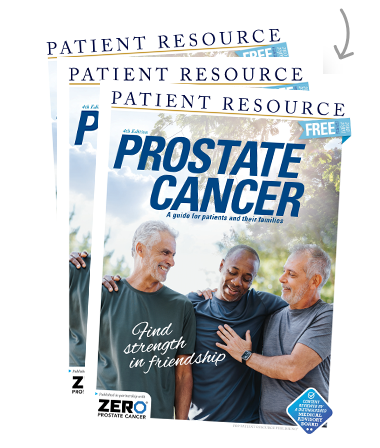Prostate Cancer
For Caregivers
Helping a loved one during a prostate cancer diagnosis and treatment can be a gift. At the same time, it can be very challenging. As a caregiver, you will likely be called on to provide physical, practical and emotional support. As you take on this new role, remember that you don’t have to shoulder every responsibility on your own. Use the resources around you to be the most effective caregiver you can be.
You may assist your loved one in a variety of ways:
- Communicating with the health care team
- Managing and giving medications
- Helping track and manage symptoms and side effects
- Coordinating medical appointments
- Driving to and from appointments
- Shopping for and making meals (see The Role of Nutrition below)
- Helping with household chores
- Managing insurance and billing issues
These responsibilities could change on a daily basis depending on your loved one’s needs. Try to be patient and remain flexible.
Staying organized is also helpful. Create a caregiving plan to help prioritize your responsibilities. Outlining all of the things you currently do, and those you want to do, may make it easier to find opportunities to delegate tasks to others who are looking for ways to show their support. Identify friends or neighbors who are able to do certain tasks that aren’t easy for you, such as yardwork or snow shoveling. Don’t forget to reach out to your loved one’s health care team. They can offer suggestions for local caregiving companies as well as refer you to local and state organizations. If you are employed, ask your human resources department for information about any services available from your employee assistance program. Also ask about the Family and Medical Leave Act (FMLA).
You can also be a valuable source of support. Whether he is your partner, family member or friend, caring for him will add a new layer to your relationship. Managing prostate cancer is a sensitive topic, and you will have to gauge how your loved one is most comfortable communicating. Sometimes it will be helpful for you to listen; other times, it may be most helpful to simply just be there. Or, your loved one may feel more comfortable talking to a professional, such as a therapist or spiritual advisor, about such a personal topic. Some organizations also have support groups for caregivers. Talking to other people who are going through the same type of situation can be helpful.
Focus on Your Well-being
One of the most important tasks for caregivers is caring for themselves. That can be challenging because caring for a loved one facing cancer can feel overwhelming, especially if you have other obligations, such as a job, school or caring for children or parents.
Be sure to set aside time for self-care. Managing stress and staying physically and emotionally healthy should be priorities. Remember, it is difficult to take care of someone else if you are struggling.
Try to incorporate these suggestions into your daily life:
- Make and keep your doctor’s appointments.
- Follow a nutritious diet.
- Exercise. Even a short walk can boost your mood and help you feel refreshed.
- Maintain a healthy sleep schedule.
- Find a few minutes each day to relax.
- Be hopeful for your loved one and for yourself.
The Role of Nutrition
Cancer as well as its management may make it harder for your loved one to get all the nutrients his body needs. Helping him learn and keep good nutrition habits is important. A healthy diet may also contribute to his emotional health.
Involve your loved one in meal planning. Making decisions about the foods he eats may be empowering. Together, with the help of the health care team, you can make a plan that will better position you to address the nutrition-related challenges that accompany a cancer diagnosis.
Ask for a nutrition consultation or referral to a registered dietitian. Encourage your loved one to be honest about any problems he is having with eating or with certain foods. The health care team is experienced in working with people who have cancer and may offer helpful solutions.
In general, a well-balanced diet in terms of cancer includes eating and drinking enough of the foods and liquids that have important nutrients (vitamins, minerals, protein, carbohydrates, fat and water) the body needs.
Talk to the health care team about these suggestions:
- Drink enough fluids to function and to prevent dehydration.
- Eat a variety of fruits and vegetables.
- Microwave or steam vegetables when cooking to preserve the most nutrients.
- Wash fruits and vegetables well.
- Limit intake of red meat and processed meat.
- Avoid saturated fats.
- Limit alcohol.
- Attempt to maintain a healthy weight.



